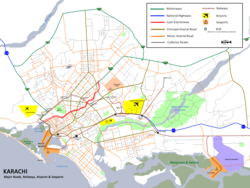Attack
According to the Counter Terrorism Department (CTD) officer Raja Umar Khattab, the attackers shot and killed the two policemen at the first check-post. The attackers then detonated hand grenades and also tried to open the main armored gate of the consulate with the help of C-4 explosives but did not succeed. The heavy firing and hand grenade blasts killed two civilians, and damaged one armored personnel carrier, two police vehicles and six other cars parked outside the consulate, of which three caught fire. [9]
Policewoman Suhai Aziz Talpur, a senior superintendent of the Karachi Police, told reporters, "Around 9 am, I got the news that there was an attack at the Chinese consulate. I was already on my way to work so we redirected and rushed to the crime scene. I already had my guards with me, senior officers were on their way. In the meantime we gathered the bomb disposal squad and fire brigade as well." [10] She organized and led the two-hour battle to defend the consulate. The battle ended after all three attackers were killed. According to Reuters, "Her fast response and actions during the nearly two-hour assault on the diplomatic mission in the southern port city have been praised for saving countless lives." She has been hailed as a hero in both Pakistan and China. [11] [12]
Victims
The policemen killed at the check-post were identified as Assistant Sub Inspector Ashraf Dawood and Constable Muhammad Amir by the Sindh Police. The two civilians killed were a father and son from Quetta, named Niaz Muhammad, 55, and Zahir Shah, 25, respectively; at the time they were waiting to renew their visas at the consulate. [13] A private security guard Muhammad Jumman employed by the consulate was injured in the blast when he tried to stop the attackers from going past the barriers. [14]
Perpetrators
The Balochistan Liberation Army claimed responsibility for the attack in a tweet that included a photo of three men [20] [21] identified as Azal Khan Baloch, Razik Baloch and Rais Baloch. All of them were killed by police during the attack. [9]
According to Express News, Aslam Baloch alias Achu - a commander of proscribed BLA, the mastermind of the attack on Chinese consulate was receiving medical treatment at the time at Max Hospital in New Delhi, India. [22] Aslam Baloch alias Achu was later killed in a suicide attack in Kandahar on 25 December 2018. [23] [24] BLA spokesman confirmed Aslam Achu and five other BLA commanders' death in Kandahar. [25] [23]
Reactions
Pakistani Prime Minister Imran Khan condemned the attack stating, "let there be no doubt in anyone's mind that we will crush the terrorists, whatever it takes." He said that "the attack was intended to scare Chinese investors and undermine CPEC" while adding "these terrorists will not succeed." [26]
Chinese Foreign Ministry spokesman Geng Shuang during a regular press briefing said that "China strongly condemns any violent attacks against diplomatic agencies." [27] He further said that the China-Pakistan Economic Corridor project would proceed despite the attack. [28] The Deputy Chief of Mission at the Chinese embassy, Zhao Lijian, expressed appreciation for the Pakistan Army and police for their "timely and proper action" in response to the attack. [27]
The Ministry of External Affairs, India, released an official statement on the day of the attack itself, saying that India strongly condemns the terror attack and that "the perpetrators of this heinous attack should be brought to justice expeditiously". [29] [30] [31] The MEA also rejected allegations of Indian involvement by Pakistani officials, calling them "false" and "fabricated". [32]
United States Chargé d'Affaires Ambassador Paul W. Jones, in a Twitter statement issued by the US embassy in Islamabad, said that the United States "condemns in the strongest terms today’s attack on the Chinese Consulate." [27]
Karachi policewoman Suhai Aziz Talpur, who led the security operation that foiled the attack, became "a star" on Chinese social media. A photo of her surrounded by commandos went viral on social media in Pakistan. [33]
This page is based on this
Wikipedia article Text is available under the
CC BY-SA 4.0 license; additional terms may apply.
Images, videos and audio are available under their respective licenses.

